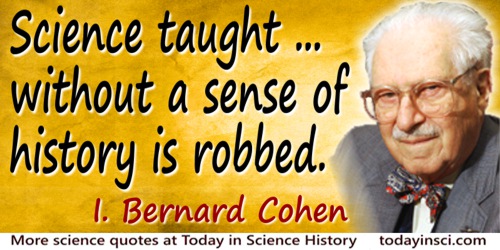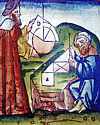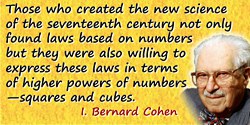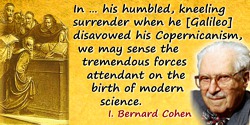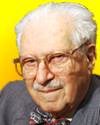 (source)
(source)
|
I. Bernard Cohen
(1 Mar 1914 - 20 Jun 2003)
American science historian who was the first American to receive a Ph.D. in history of science. He published many books on the history of science, notably Principia: Mathematical Principles of Natural Philosophy, the first English translation of Newton's work since 1729.
|
I. Bernard Cohen
“Science taught without history”
Illustrated Quote - Medium (500 x 250 px)
More I. Bernard Cohen quotes on science >>
This quote comes from the collection General Education in Science edited by I. Bernard Cohen with Fletcher G. Watson. It appears in an essay by Cohen, 'The History of Science and the Teaching of Science', in which he writes:
“History without the history of science, to alter slightly an apothegm of Lord Bacon, resembles a statue of Polyphemus without his eye—that very feature being left out which most marks the spirit and life of the person. My own thesis is complementary: science taught … without a sense of history is robbed of those very qualities that make it worth teaching to the student of the humanities and the social sciences.”
Polyphemus appears in Greek mythology as a man-eating Cyclops giant, whose notable feature is a single orb-shaped eye set in the middle of his forehead. The reference which Cohen paraphrased, is in Francis Bacon’s, The Advancement of Learning, which contains the original statement:
“History is natural, civil, ecclesiastical, and literary; whereof the first three I allow as extant, the fourth I note as deficient. For no man hath propounded to himself the general state of learning to be described and represented from age to age, as many have done the works of Nature, and the state, civil and ecclesiastical; without which the history of the world seemeth to me to be as the statue of Polyphemus with his eye out, that part being wanting which doth most show the spirit and life of the person.”1
An apothegm is an aphorism: a short, pithy, and instructive saying or formulation. The word derives from the Greek word, apophthengesthai to speak out (from apo- + phthengesthai to utter).2
2 From Merriam-Webster Dictionary online. (source)
- Science Quotes by I. Bernard Cohen.
- 1 Mar - short biography, births, deaths and events on date of Cohen's birth.
- I. Bernard Cohen - context of quote “Science taught without history” - Large image (800 x 400 px)
- The Triumph of Numbers: How Counting Shaped Modern Life, by Bernard Cohen. - book suggestion.
- Booklist for I. Bernhard Cohen.
